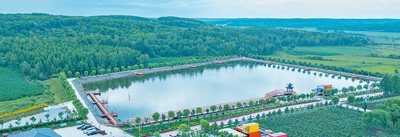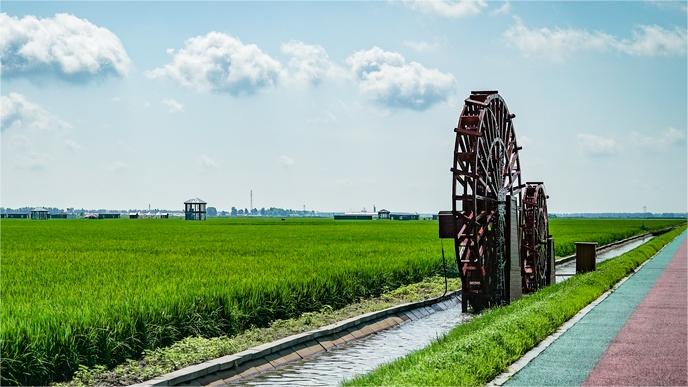Former lumberjacks and lumberyards in NE China embrace change amid national trend toward ecological conservation
“Our lives have changed so much in recent years,” said Wang Kai, a lumberjack-converted forest ranger in northeast China. “The logging area has transformed into a scenic area, and the once harsh winter landscapes have become treasures. We never imagined such things before.”
Wang is among the workers in state-owned forest companies who have transitioned from logging to a variety of careers following a ban on commercial logging in the state-owned forests of the Khingan Mountains, Heilongjiang Province, 10 years ago.
On the forest farm where Wang works, namely the Weixing Forest Farm operated by China Longjiang Forest Industry Group Co., Ltd., there are many former employees of the company working as tour guides and service staff, or running hotels.

Photo shows a nursery garden of a forestry bureau under China Longjiang Forest Industry Group Co., Ltd., based in northeast China’s Heilongjiang Province. (Xinhua/Xie Jianfei)
“The ice and snow tourism craze that arose at the beginning of this year has driven a significant increase in tourists. Our fleet of 20 snowmobiles hardly ever had any downtime,” said Cao Jie, a 46-year-old former lumberjack who now runs a snowfield recreational equipment rental shop in the forest farm.
“Our income during peak tourist season is quite good,” Cao noted.
Many other forest farms across the province have also witnessed employees’ transformation into various other careers.
Yang Zhen, a retired employee of Heilongjiang Yichun forest industry Refco Group Ltd., has devoted himself to the development and design of handicrafts made from a rare wood material, joining the efforts to carry forward the culture of wooden art.
Zhang Wenxin, a former lumberjack from a forestry bureau under China Longjiang Forest Industry Group Co., Ltd., has become a tour guide for a forest-themed sightseeing miniature train.
He Xiyan, an employee of Longhe forest farm operated by a forestry bureau under the Greater Khingan Forest Industry Group, has taken advantage of the free training provided by the forestry bureau and set foot in the burgeoning field of e-commerce livestreaming, earning an additional income of over 20,000 yuan ($2,790.84) annually.
The successful career transition of these former lumberjacks mirrored the forest areas’ remarkable achievements in restoring and preserving the ecological environment of forests, developing diversified industries such as ecotourism and forestry economy, and continuously ensuring and improving people’s livelihoods.
Over the past decade, major state-owned forest areas in Heilongjiang have implemented various measures such as cessation, management, restoration, and afforestation to standardize the knowledge and technical procedures for tree cultivation.
As a result, the forest ecosystem of relevant areas has been effectively restored, with forest land area growing to 21.62 million hectares, forest growing stock reaching around 2.16 billion cubic meters, and the number of terrestrial wild animal species inhabiting the forest areas rising to around 500.
Technological empowerment has played a crucial role in the forest areas’ ecological restoration efforts.
According to Qin Ruiliang, executive of Xishui forest farm under Heilongjiang Yichun forest industry Refco Group Ltd., large-scale application of advanced seedling cultivation technologies since 2021 has shortened the cultivation period of Korean pine seedlings from four years to about two years while extending the planting period from less than a month to the three seasons of spring, summer, and autumn.

Forest rangers from China Longjiang Forest Industry Group Co., Ltd. based in northeast China’s Heilongjiang Province, patrol a forest area. (File photo)
Xie Yong, a 58-year-old forest ranger from a forestry bureau under the Greater Khingan Forest Industry Group, can now upload information including the routes of his patrol inspections onto online platform in a real time manner, thanks to a forest patrol app empowered by China’s BeiDou Navigation Satellite System (BDS).
“The app not only allows users to record their patrol routes but also enables them to send real-time information about problems found during the patrol to the command center, greatly improving patrol efficiency,” Xie noted.
In addition to new technologies and apps, drones and forest monitoring systems, among other advanced equipment, have also facilitated forest conservation.
“We used to rely solely on binoculars and rangefinder compasses for observation. Now, with the help of drones and forest surveillance cameras on the top of observation towers, we are able to use technologies such as multispectral fusion to transmit real-time images of the surrounding area back to headquarters,” said Wang Liuyang, a watch-keeper of a forestry bureau under China Longjiang Forest Industry Group Co., Ltd.
“Once any abnormal condition is detected, the backend monitoring center immediately sends out an alarm signal, which is displayed on the GIS map,” Wang added.
These efforts have yielded remarkable results, significantly improving the relevant forest areas’ ecological environment while boosting the development of ecotourism and the forestry economy.
During the past 10 years, the number of visitors to Heilongjiang River First Bay scenic area has grown eightfold, and the revenue of the scenic area has increased from several hundred thousand yuan per year to over 13.5 million yuan, according to An Shichun, manager of an ecotourism company in Heilongjiang.
“I will bring my family here for vacation again. The air is fresh and cool, and the natural beauty has left a deep impression on me,” said Wang Yizhen, a tourist from southwest China’s Chongqing Municipality.
The forestry economy has also enjoyed rapid development since the forest areas shifted from a single resource-consuming path of timber production and processing to integrated development of diversified industries.
Industrial parks of medicinal herbs and fruits, for instance, have thrived in the forest areas, effectively boosting the economic development and employment of relevant localities.
An industrial park of the medicinal plant Siberian Ginseng has seen its output value reach 60 million yuan in a little more than a year after beginning operations, according to Zhang Daozhi, executive of the industrial park.
The blueberry industrial park of a forestry bureau under Heilongjiang Yichun forest industry Refco Group Ltd. has created jobs for nearly 100 villagers from the surrounding areas, who can earn an average monthly income of over 5,000 yuan each by working for the industrial park during the agricultural off-season, said Zhang Xingyu, deputy director of the industrial park’s administration office.
A forest food processing company that produces dried blueberries, blueberry wine, and blueberry puree beverages using blueberries from the industrial park achieved an annual output value of around 23 million yuan last year, according to Yu Wei, production manager of the company.
“We plan to double the amount of blueberry raw materials this year,” Yu said.
All of this goes to show that halting logging does not signify an end, but rather a new beginning. On this new journey, the forest areas are continuously fortifying ecological safety barriers, exploring new paths for industrial transformation, and writing a new chapter in livelihood improvement. As locals often say, “We want to make our happy lives as long-lasting as the green of the Khingan Mountains.”
Photos
Related Stories
- National Ecology Day special: Saihanba's green tales for the world
- China's Sanming embraces green transformation to boost rural tourism
- Natural scenery of Makehe primitive forest farm in Qinghai
- Forest of endangered trees found in SW China
- Fuxin city in NE China's Liaoning sees remarkable success in desertification control
- In pics: Explore ecological beauty of forests in the Great Khingan Mountains
Copyright © 2024 People's Daily Online. All Rights Reserved.









